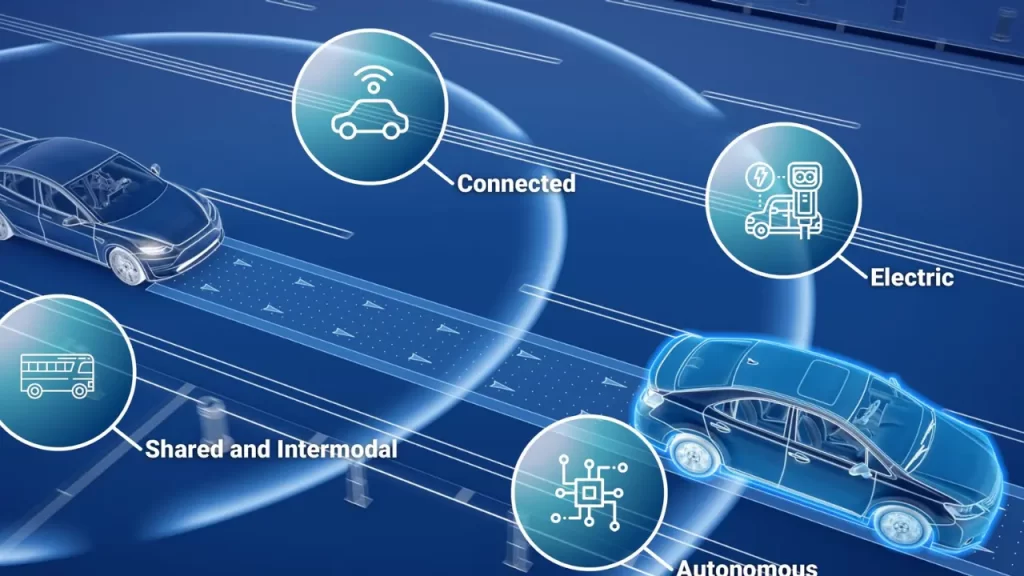Introduction
Electric vehicles (EVs) have become a potential answer as the globe has seen a substantial movement toward sustainable transportation in recent years. Looking ahead to the future of transportation, it is sure that EVs will play a significant part in revolutionizing how we travel. This article explores the promise of electric cars, their effect on the environment, recent technical developments, and upcoming difficulties.

The Rise of Electric Vehicles
Over the past ten years, the use of electric cars has increased exponentially. Governments, automakers, and consumers have all acknowledged the need for environmentally friendly transportation options. Compared to conventional internal combustion engines, electric cars provide a more efficient, environmentally friendly, and clean form of transportation.
Environmental Benefits of Electric Vehicles
Using electric cars considerably lowers greenhouse gas emissions and enhances air quality. EVs lessen pollution in cities and assist in slowing down climate change by replacing fossil fuel-powered automobiles. The transition to electric cars advances a sustainable future and tackles the problems associated with global warming.
Technological Advancements in the Electric Vehicle Industry
Technology has advanced remarkably in the electric car sector. Innovation has been the key to the success of electric vehicles, from better battery technology and longer ranges to faster-charging capabilities. To improve EVs’ effectiveness, efficiency, and affordability, businesses are making significant investments in research and development.
Infrastructure Challenges and Solutions
Creating a reliable charging infrastructure is one of the significant obstacles to the mass adoption of electric cars. A network of charging stations is necessary for electric vehicle drivers to experience convenience and lessen range anxiety. Governments and business organizations are working together to create charging networks, including fast-charging stations along roads and in metropolitan areas.
The Role of Government and Policy
Government support and favorable policies play a vital role in promoting the growth of electric vehicles. Incentives such as tax credits, subsidies, and rebates encourage consumers to switch to electric cars. Additionally, regulations promoting clean transportation and setting emission standards push automotive manufacturers to invest in electric vehicle technologies.
Electric Vehicles and the Global Market
Globally, the demand for electric vehicles is increasing fast. The use of EVs is booming in places like China, the United States, and Europe. Automotive manufacturers are rapidly expanding their product ranges and investing in EV production to keep up with the rising demand for electric vehicles worldwide.
Overcoming Range Anxiety
Potential EV purchasers frequently worry about running out of battery power, known as range anxiety. However, the driving range of electric vehicles has substantially expanded thanks to developments in battery technology. Additionally, the worries related to range anxiety are reduced by the action of fast-charging technology and the growth of charging infrastructure.

Electric Vehicles in Public Transportation
More and more public transit options, including taxis, buses, and other vehicles, are becoming electric. Public transportation organizations are converting their fleets to electric cars to cut emissions and give passengers greener mobility alternatives. In addition to enhancing air quality, electrifying public transit lowers noise pollution in metropolitan areas.
The Future of Autonomous Electric Vehicles
The transportation sector is about to undergo a revolution thanks to the confluence of electric and autonomous car technology. Electric autonomous cars have the potential to provide more convenient, safe, and adequate transportation. Self-driving electric vehicles are anticipated to become a frequent sight on our roads and revolutionize the way we commute with further research and development.
Electric Vehicles and Renewable Energy Integration
There is a lot of potential for combining electric cars and renewable energy sources. Electric vehicles (EVs) can serve as mobile energy storage devices, assisting in grid balancing and maximizing the use of renewable energy. Electric cars are becoming a crucial component of the renewable energy ecosystem because to vehicle-to-grid (V2G) technology, which facilitates bidirectional energy flow between EVs and the power grid.
Electric Vehicle Batteries and Charging Technologies
Electric car battery technology is a crucial component. Increased energy density, longer battery life, and quicker charging periods have all been made possible by improved battery chemistry and manufacturing techniques. Superchargers and other rapid charging technologies are being used to provide EV owners with speedy and practical charging.
Electric Vehicles and Job Creation
Switching to electric cars benefits the environment and the labor market. As the need for electric vehicles expands, new job possibilities are created in manufacturing, battery technology, charging infrastructure development, and maintenance services. This shift offers an opportunity to promote economic growth and develop a trained workforce.
Electrifying the Commercial Fleet
Commercial fleets, including delivery trucks and logistics vehicles, are increasingly being electrified. Businesses are starting to see the economic and environmental benefits of switching their fleets over to electric cars. Emissions are decreased over time, as are operational expenses by electrifying the business sector.
Electric Vehicles in Developing Countries
Electric cars could revolutionize how people get around in underdeveloped nations. These countries may embrace electric mobility and tackle the problems of urbanization, pollution, and energy security while advancing traditional automotive technology. Governments and international organizations must support using electric cars in developing nations.
Conclusion
How people travel in the future will depend on how commonplace electric vehicles become. EVs offer a realistic solution for a sustainable future because of the benefits they provide for the environment, their technological advancements, and their capacity to alter transportation networks. Governments, automakers, and the general public must collaborate to overcome the difficulties and realize the full potential of electric vehicles.
FAQs
- Are electric vehicles more expensive than conventional cars?
- Despite having a more significant initial investment, electric cars often have lower ongoing operating and maintenance expenses, which results in long-term savings.
- How long does it take to charge an electric vehicle?
- Charging times might vary depending on the charging technique and the vehicle’s battery size. Compared to regular home chargers, fast chargers may deliver a considerable charge in 30 to 60 minutes.
- Can electric vehicles go long distances?
- The driving range of electric vehicles has significantly expanded in recent years. Several EV models can now go more than 200 miles on a single charge, considerably reducing charging periods thanks to advancements in fast-charging technology.
- Is the charging infrastructure sufficient for electric vehicles?
- Although the charging station network is continually being expanded, the infrastructure for charging is still under development. Governments and commercial organizations are investing in the infrastructure needed for charging to support the increasing number of electric vehicles on the road.
- How do electric vehicles contribute to a sustainable future?
- Electric vehicles’ zero tailpipe emissions decrease air pollution and greenhouse gas emissions. By converting to electric transportation, we can reduce the consequences of climate change and improve the quality of our surroundings.
